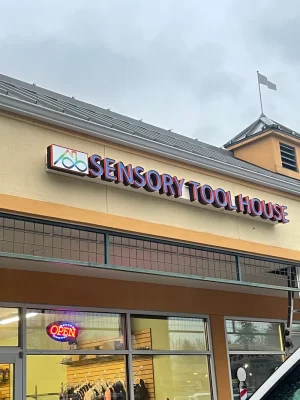As a parent of a neurodivergent child, I often wonder (and worry) about the opportunities for employment for him as an adult. According to the University of Connecticut’s The Center For Neurodiversity & Employment Innovation, unemployment for neurodivergent adults runs at least as high as 30-40%, which is three times the rate for people with disability, and eight times the rate for people without disability. “Neurodivergent adults who are eager to work professionally are often left out of the workforce or forced into lower-skill jobs for a variety of reasons – non-inclusive hiring and retention practices, lack of employer education and training, absence of support ecosystems on the job, and skill differences or needs that often do not align with standard business operations all contribute to the problem.”
Sensory Tool House LLC in Lacey, Washington, started out for owner Katie McMurrray as a business to meet a need. It was during the start of the Pandemic, and Katie’s friends asked her where they could buy locally a sensory swing like the one she had for her own child. There were no options, so Katie created one. Sensory Tool House carries sensory items such as liquid timers, hammock swings, compression shirts, bubble wall, etc. What makes Sensory Tool House stand out from their competitors is they have a retail store for customers to try these products, but also 90% of their employees are neurodivergent themselves.
The employees at Sensory Tool House understand their customers’ needs and the sensory overload they experience firsthand. In speaking with Lauren Howard, Director of Resources, she told me their employees are knowledgeable and can sometimes make “off-label” recommendations. She reminded me “Sensory needs don’t go away when you become an adult,” and they are here to help people find items that will meet their sensory needs. In addition to a wide variety of sensory products, they also offer professional services to businesses so they can make their work environments more sensory-friendly to their employees.
In a time where employers are having a challenging time finding applicants, let alone qualified applicants to fill their openings, Sensory Tool House LLC has been receiving an overwhelming response from candidates, candidates that are highly qualified. Lauren told me they are very upfront about the wages in a retail environment, and the response is normally “I don’t care”. Neurodivergent applicants are eager to find an employer that understands them and understands their needs. A place where they don’t have to mask and can be themselves.
One Sensory Tool House employee said “Accommodations are not viewed as an inadequacy at STH. The culture created at my workplace makes it comfortable to ask for accommodations if I need them. I have always felt afraid to ask for accommodations at previous workplaces. STH is structured in a way that is accommodating of many differences by default. This means asking for formal accommodations often isn’t actually necessary.” Another employee said this about Sensory Tool House “I don’t have to hide that I’m autistic out of fear of being discriminated against. My opportunities are not limited by the bias of my employer. If anything, being autistic makes me more credible in my workplace.”
Sensory Tool House shows that as an employer, accommodations can be made to help neurodivergent employees thrive and grow in the workplace. Neurodivergent employees can bring a unique skillset to any workplace, if given the opportunity to demonstrate those skills. Businesses can grow by tapping into this workforce, and everybody wins.
The next time you’re in the market for purchasing a sensory product, consider Sensory Tool House LLC. Support neurodiverse-owned businesses, because they are supporting kids like yours and mine and showing the world that being different isn’t less than, but just as valuable to the world as everyone else.


